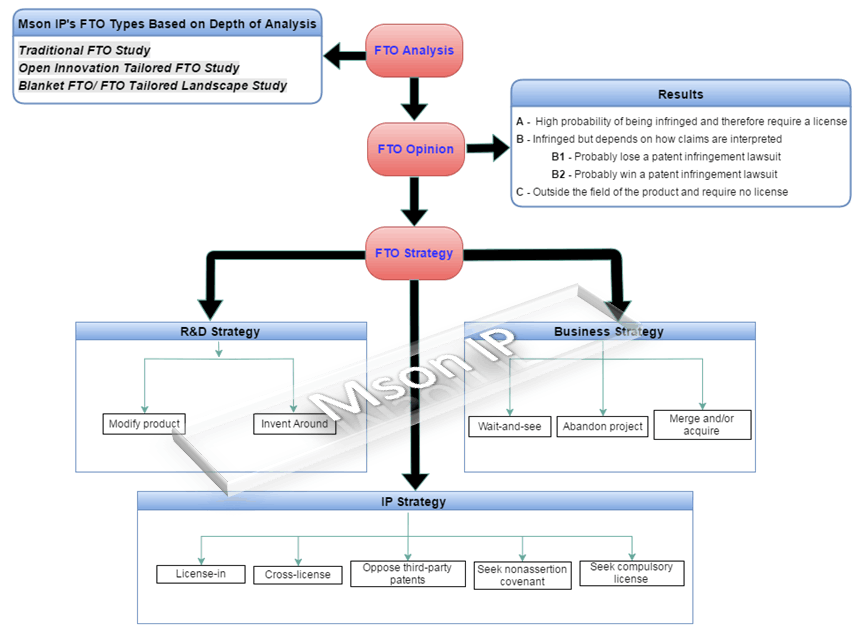Open Innovation Tailored FTO Study – Mson’s Open Innovation Tailored FTO Study helps to devise collaboration strategies apart from FTO opinions.
Note: Search is global and not restricted to any applications.
Blanket FTO/ FTO Tailored Landscape Study – Mson has designed a special framework named Blanket FTO/ FTO Tailored landscape study to derive FTO opinions for multiple products at a time which will be operating in similar industry. This helps in saving enormous time and money for our clients.
Deliverables:
For mapping out a technical field
To know the possible infringement
To know the countries where possible rights apply
As inspiration prior to the commencement of a new development project
To know who is operating within a given field
To evaluate the potential for new activities in an area
To design around.
To devise collaboration strategies.
FTO Opinions:
a) High – High probability of being infringed and therefore require a license.
b) Medium – Infringed but depends on how claims are interpreted.
b1) Med – Prediction 1 – Probably lose a patent infringement lawsuit.
b2) Med – Prediction 2 – Probably win a patent infringement lawsuit.
c) Low – Outside the field of the product and require no license.
FTO Strategies:
a) Legal/IP Management Strategies :
i) License-in – Issues relating to FTO can be fixed by getting commercial license from owners/ assignee for each IP right of the product likely to infringe.
ii) Cross-license – Exchange IP’s through licensing.
iii) Oppose third-party patents – Try invalidating possible infringement patent assets.
iv) Seek non assertion covenant – A non assert is an implied license. Put differently, a non assert is an agreement that certifies that the party or parties to the implied agreement will not assert or defend certain rights that they possess.
v) Seek compulsory license – Compulsory licensing is when a government allows someone else to produce the patented product or process without the consent of the patent owner. It is one of the flexibilities on patent protection included in the WTO’s agreement on intellectual property — the TRIPS (Trade-Related Aspects of Intellectual Property Rights) Agreement.
b) R&D Strategies:
i) Modify product – An alternative to licensing is to change the product specifications/dimensions.
ii) Invent around – Choosing the invent-around option would require a research team to search for alternative ways/materials to develop the product in question.
c) Business Strategies:
i) Wait-and-see – The simplest option is to commercialize the product under question and wait to see if the IP holder contacts you for a license. If and when that happens, it would still be possible, perhaps, to come to a licensing arrangement. Alternatively, the option of opposing a third-party patent could be pursued as a form of defense. In addition, a cross-license might be offered in return.
ii) Abandon project – Decide if you should cease activity before it costs you significantly.
iii) Merge and/or acquire – Opinion to access IP’s from identical & also parallel industries to reduce the time to market


